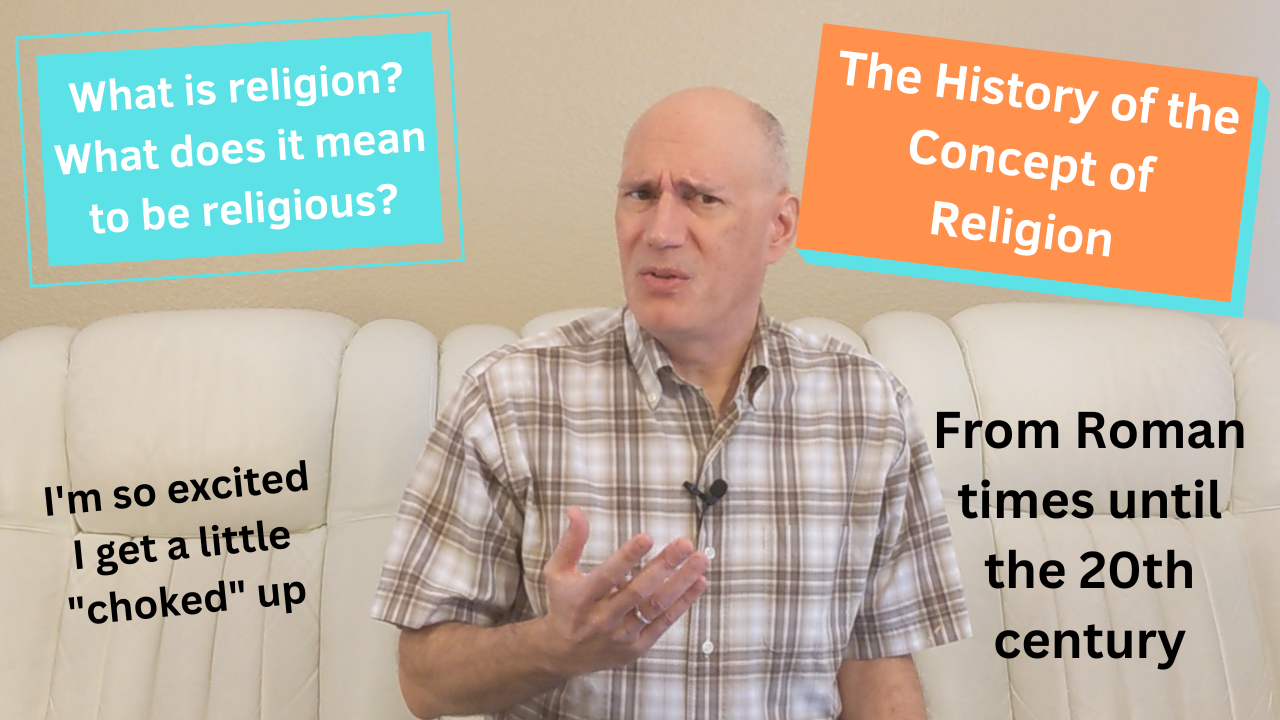02/15/2023 – The History of the Concept of Religion

What is religion? What does it mean to be religious? Have you ever wondered where this word came from or how it developed throughout Western history? Me too. I poked around a little bit and this is what I discovered. Check it out. This is TenOnReligion.
Hey peeps, it’s Dr. B. with TenOnReligion. If you like religion and philosophy content one thing I really need you to do is to smash that sub button because it really helps out the channel. The transcript is available at TenOnReligion.com and new episodes are posted about every two weeks, at noon, U.S. Pacific time, so drop me some views. I need some YouTube watch hours. Uhh, you can just run the video the video by the way, you don’t even have to listen to it.
This is a quick overview of the development of the concept of religion in Western history. I could start this in ancient Greece or perhaps even earlier, but that would make this way too long. I’m going to start with Roman history and go up to the early 1900’s. Let’s get started.
In the Roman world, in BCE times, two ancient ideas or streams of meaning coalesced into one Latin word, religio. These two ideas were: some objective reality outside the human vs. an internal subjective attitude by which humans relate to that reality. Religio came to be the observance of a particular practice in reference to the divine such as traditional cultic patterns at a god’s shrine. In Roman culture, the outward expression of this cultic practice or ceremony was often more important than the god itself. But what kind of ceremonies are we talking about here? Many deities in the Roman world began as either agricultural forces or some other aspect of personality. These deities required propitiation, appeasement, pacification, and soothing or calming. Some of these, called Numina, were abstract names lightly divinized as forces to be respected. Notice these were forces rather than entities. Prayers were for things like agricultural and reproductive success or were related to Roman values of order and hierarchy. They possessed a strict formalism with attention to maintaining the proper form. By the time of Cicero (106-43 BCE) religio focused more on an internal attitude representing the practice of reverence and feeling when one performs the proper duties towards the gods.
The emergence of Christianity onto the scene in the first few centuries of the new millennium CE challenged this understanding by making religion more systematized. This was quite different from the wide and varied traditional cultic observances of normal Greco-Roman life, which Christianity condemned. Yet Christian leaders retained the concept of religion in the Latin phrase religio dei, worship of God, which was the feeling on the part of the worshipper representing their attitude towards God and the universe as a whole. This set up a situation of one over against the other with a new notion of boundaries between nostra religio, or “our” religion, as distinct from the religions of outsiders. By the time of Lactantius in the early 300’s CE, a separation was introduced between vera and falsa religio, or true and false religion. In a somewhat similar vein Augustine refers to vera religio, true religion, not as a system of observances or beliefs, but as a personal engaging relationship with God which only can be made possible through the Christian church via the Christ figure. This takes us into the 400’s CE where things take a turn because many Christian writers then began to favor the word “faith” over the word “religion.” Common people had faith. Those who were religious were those who took monastic vows and became monks in a medieval monastery. Almost like they were professional religious…people or something like that.
This lasted until the Renaissance which gave rise to the Protestant Reformation in Europe. Since the far majority of Europeans were influenced by Christianity, religion was not a term used to separate Christianity from other religions externally, but rather was used internally. False religio, in Zwingli’s view, was false piety or superstition which occurred when people put their trust in something other than God, such as treating the church, popes, councils, or other authorities as divine. In John Calvin’s writings, for another example, religio was an inner personal attitude which prompted one to worship God, which is why the closest contemporary equivalent word might be piety.
The situation changed considerably with the dawn of the Enlightenment in the 1600’s and 1700’s. Religion became a systemic and abstract intellectual construct as a system of ideas. It was an observable product along with a historical wake which could be studied. As such, it was an impersonal schematization of things. Let me explain because here’s where it gets really interesting. When one used the word “religion” for oneself, as self-identification, one usually meant it as a reference to one’s deep and personal faith, oriented transcendentally. When one used the word religion towards others in a negative fashion, it usually meant what could be observed externally as a system of beliefs or rituals, more of an abstract and impersonal description. This is because one did not share the transcendental relationship and could not see the point. There was no personal connection. Thus, when another person attacked one’s own religion on these external grounds, the defense one put forth was in the same terms – speaking of religion in an external and theoretical sense even though one rarely thought of one’s own faith in those terms. According to religion scholar W. C. Smith, the plural term “religions” during this time period was impossible when referring to something personal and internal. Obedience, reverence, and worship were not words commonly used in the plural. The plural term “religions” were only used from an outside perspective which abstracted, depersonalized, and reified the systems of other people of which one does not see the meaning, much less appreciate or accept the validity. Names and labels were created to criticize. The phrase “religions of the world” was first used in order to refute them. One has “faith” while the other person has “religion.” Like…wow.
In 1799, Schleiermacher published On Religion: Speeches to its Cultured Despisers which was the first book written on religion itself as some sort of a generic something. It was a push to reject the observation of religion as outward appearance and think of religion in terms of the heart and inward emotions. Then came Hegel who made religion into a Begriff, the German word for concept, whereby religion was a transcendent idea unfolding in the dynamic expression of all history itself. This was followed by Feuerbach’s 1851 work, The Essence of Religion, where religion is a reified concept in reference to human self-consciousness. Check out my episode a few years ago on Feuerbach when my production ability was a little bit, uh well, a little bit worse.
So, based on this historical overview let’s try to analyze how “religion” is used today. First, religion is still used to designate piety in a person. “She’s more religious now than a few years ago.” Second, religion is an ideal system which usually refers to an adherent talking about their own version of their tradition. True Buddhism, true Islam, true Christianity and so forth is the one that I practice. Third, there is the empirical reality of the tradition which can be traced back through history via important documents, people, events, and development of ideas. Fourth, there is religion as a generic, abstract concept. A category with which other things could be put under, like an umbrella. We *understand* something to be religious or part of a religion because it *stands under* the category “religion.” Did you like that? See what I did there? It’s a rather flexible and fluid category which seems quite diverse due to the fact that many scholars have different definitions of the category and incessantly debate about which things fit into that category we call religion.
The concept “religion” has evolved in the West as a long-range historical development which was a process of reification. This meant mentally making religion into a thing and gradually coming to conceive it as an objective systematic entity. Once the category has been created, the rise into Western consciousness in relatively recent times of several so-conceived entities emerged known as the religions of the world. The first gathering of leaders from the religions of the world occurred in 1893 in Chicago, called the World’s Parliament of Religions. It was part of the larger World Columbian Exposition, the forerunner of the world’s fair. Around the same time period, between 1879 and 1910, Max Müller’s 50-volume Sacred Books of the East was published as a compilation of sacred texts from seven Asian “religions.” This project from this German scholar of philology, or language studies, was largely responsible for framing how we understand religion as a category today. What was then called the science of religion required a process of classification in order to proceed. The entire historical development of a classification system for religion in the 1800’s and 1900’s is absolutely fascinating, but it’s also long and complicated so we’re not going there today in this episode.
So, where does that leave us? Does Hinduism exist? Does Christianity exist? Does Buddhism exist? Does Islam exist? Does Judaism exist? Does Sikhism exist? And so on. In our minds as abstract classification concepts…maybe. In reality as lived expressions…not really. Religious adherents often describe their personal journeys in other terms such as faith, observance, prayer, meditation, or express them through other mediums like music, poetry, and dance. Putting it bluntly, how we use the word “religion” and what it means…there’s a whole lot of variety going on there.
So, what do you think about the historical development of the concept of religion? What did you find the most interesting and why? Leave a comment below and let me know what you think. Until next time, stay curious. If you enjoyed this, support the channel in the link below, please like and share this video and subscribe to this channel. This is TenOnReligion.


